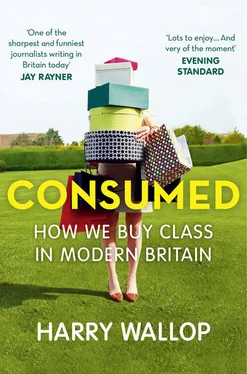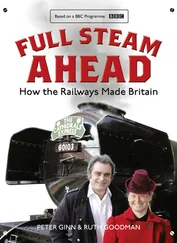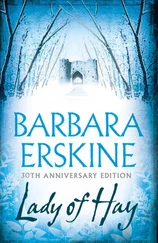CONTENTS COVER
TITLE PAGE CONTENTS COVER TITLE PAGE INTRODUCTION 1. FOOD 2. FAMILY 3. PROPERTY 4. HOME 5. CLOTHES 6. EDUCATION 7. HOLIDAYS 8. LEISURE 9. WORK CONCLUSION NOTES ACKNOWLEDGEMENTS ABOUT THE AUTHOR COPYRIGHT ABOUT THE PUBLISHER
INTRODUCTION
1. FOOD
2. FAMILY
3. PROPERTY
4. HOME
5. CLOTHES
6. EDUCATION
7. HOLIDAYS
8. LEISURE
9. WORK
CONCLUSION
NOTES
ACKNOWLEDGEMENTS
ABOUT THE AUTHOR
COPYRIGHT
ABOUT THE PUBLISHER
‘We are all middle class now,’ said John Prescott to howls of derision in 1997, in the run-up to the general election that swept Tony Blair into power.
Prescott was, of course, Blair’s bruising, working-class sidekick who had gone to sea at the age of 16 and worked his way up the ranks of P&O. With his pugnacious beliefs and mangled English, he was wheeled out to persuade old Labour voters that Blair, the first prime minister since Sir Alec Douglas-Home to attend a public school, understood their concerns. The idea that Prescott was middle class seemed as likely as finding caviar in Lidl.
But 15 years on, his astute comment has been proved correct, with the great majority of us considering ourselves middle class. Meanwhile he’s sitting in the House of Lords, the ultimate sanctuary of the ruling elite of Britain, and Lidl sells John West lumpfish caviar. Yours for £2.48 for a 50g tin.
The election was held on 1 May 1997. It was, I remember, a very warm day, and in glorious sunshine I cast my ballot for regime change, as nearly all students that day did. It was the summer of my finals at Oxford, and for a generation who had only ever known Margaret Thatcher and John Major things really could only get better, as D:Ream sang. My vote was not really political; it was generational.
That evening I went down to London to attend the dinner to celebrate my cousin’s 21st birthday. It was being held at White’s, the smartest of all London’s gentlemen’s clubs, a glorious early Georgian building on St James’s, which had once served as the unofficial headquarters of the Tory party and where the Prince of Wales had his stag night. The dress code, as it is always at gentlemen’s clubs, come rain or stifling heat, was jacket and tie. I turned up in a three-piece tweed suit. Nowadays I would call it vintage. Then, it was charity shop chic, bought in a second-hand outlet in Oxford for a student Chekhov play. It was, in reality, a 1950s garment, but accessorised correctly I was sort of passable as a turn-of-the-century Russian doctor hanging out near a cherry orchard. I thought I looked pretty stylish.
My father thought otherwise. Possibly the mildest mannered man you could imagine, he exploded with ill-concealed contempt, ending with the immortal lines uttered without any hint of irony: ‘Gentlemen do not wear tweed after six o’clock in London.’
Behind this temper was, I knew, a deep-seated disappointment that I had let him down. My entire upbringing had been an extended lesson in the British class system, and its tiny invisible rules, a living out of Nancy Mitford’s list of ‘U and non-U’ words to ensure my vocabulary did not embarrass any of the guests for tea. Debrett’s was occasionally brought down from the shelf to teach me how to address envelopes correctly to the assorted earls, countesses and viscounts from whom I had received Christmas presents. Mostly these were aunts and cousins. How to curtsy to royalty, eat asparagus and artichokes, pluck a pheasant, tip a gamekeeper, when to leave the room, what one wore – this was not some parlour game, this was just how I was brought up in west London in the 1970s and 80s. These rules were never drilled into me, they were merely taught alongside tying one’s shoelaces, riding a bicycle and asking to get down from the table. It seemed, as it always does for any child, normality itself. Whether one wore tweed after six, brown in town, if one called it ‘pudding’ or ‘dessert’ were things I was just meant to know. If I wanted to look like a tramp in my student flat, fine, but please God, not in White’s.
I had got it wrong and my father believed I had done so on purpose as some sort of silent political protest – though it was clearly laughable to suggest that wearing tweed in the grandest of all St James’s clubs was an act of solidarity with John Prescott.
I spent the entire evening fuming, as the grandees around me fumed too about how the incoming government was going to ruin Britain. The votes had yet to be counted, but the landslide was already inevitable. Change was in the air, but not in this privileged corner of SW1. Surely, I argued, in the summer of 1997 such niceties of class and of what gentlemen did or did not do were not just a decade out of joint, but a full century? Apparently not.
And 15 years later the niceties are still very much alive – just in a different form. Class has never gone away. Even after the years of never having it so good, the white heat of technology, the no turning back, 13 years of New Labour and, now, of being all in it together. If anything, it is more prevalent than it has ever been and it touches nearly everyone, including millions who consider class an irrelevant anachronism. John Major promised a classless society by the end of the 1990s, Tony Blair said that the old establishment was being replaced by a new, larger, more meritocratic middle class, Gordon Brown vowed to create a generation that would build a Britain where the ‘talent you had mattered more than the title you held’. But for all the pronouncements from various different governments, the country is obsessed as much as ever about class. When the chief whip Andrew Mitchell reportedly hurled abuse at a Downing Street policeman, he was mostly criticised not for his appalling manners, but for his alleged use of the word ‘pleb’, confirming in the eyes of the critics of the Government such as Polly Toynbee that ‘the social class of Cameron’s crew … rule for their own ruling class’. 1
A whole host of activities and institutions are attacked for being ‘too middle class’ – the Church of England, English Heritage, Girl Guides, tennis, BBC sitcoms, the Labour party. Various broadcasters, the Chelsea Flower Show, the Royal Opera House and the entire cabinet are derided for being ‘too posh’; rows over the education system are almost entirely centred around how to ensure more working-class children get better grades and places at university; hands are wrung about how nearly every Bafta winner and top-40 musician went to private school, and why a disproportionate number of white working-class boys end up out of work, out of a job, out of luck.
It’s not just the press which casts so much of what they write about in the molten, malleable language of class – ‘Are your neighbours middle-class cocaine addicts like me?’ 2is a recent headline in the Daily Mail . Policy makers too increasingly see class as the cause of so many of Britain’s economic and social woes. The Office for National Statistics, and a dazzling array of think-tanks and research houses, publish almost weekly data to show that social inequality continues to widen in Britain – your health, your wealth, your happiness are all related to the social class you belong to. An astonishing amount of time and money is spent measuring and defining the socio-economic groups that make up modern Britain: C1, D, Class 1, managerial, semi-routine sales occupation, intermediate clerical. These groups are meant to be as objective and statistically robust as possible. And all serve to help the Government and its agencies attempt to improve ‘social mobility’ – the ultimate goal of so many in charge.
But the dry statistics relating to the upper deciles, the long-term economically inactive, the ‘discouraged’ and higher managerial classifications are not a true reflection of class in Britain today.












